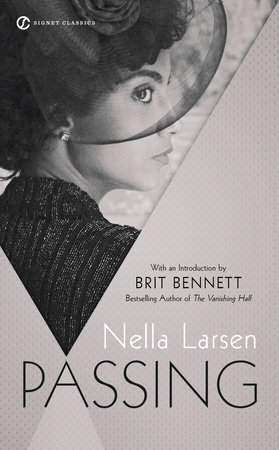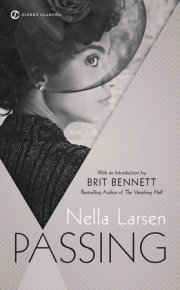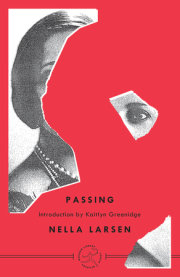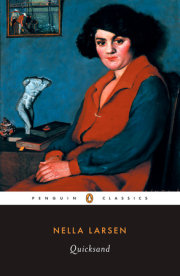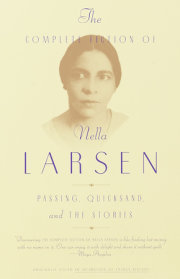CHAPTER ONE
It was the last letter in Irene Redfield's little pile of morning mail. After her other ordinary and clearly directed letters the long envelope of thin Italian paper with its almost illegible scrawl seemed out of place and alien. And there was, too, something mysterious and slightly furtive about it. A thin sly thing which bore no return address to betray the sender. Not that she hadn't immediately known who its sender was. Some two years ago she had one very like it in outward appearance. Furtive, but yet in some peculiar, determined way a little flaunting. Purple ink. Foreign paper of extraordinary size.
It had been, Irene noted, postmarked in New York the day before. Her brows came together in a tiny frown. The frown, however, was more from perplexity than from annoyance, though there was in her thoughts an element of both. She was wholly unable to comprehend such an attitude toward danger as she was sure the letter's contents would reveal; and she disliked the idea of opening and reading it.
This, she reflected, was of a piece with all that she knew of Clare Kendry. Stepping always on the edge of danger. Always aware, but not drawing back or turning aside. Certainly not because of any alarms or feeling of outrage on the part of others.
And for a swift moment Irene Redfield seemed to see a pale small girl sitting on a ragged blue sofa, sewing pieces of bright red cloth together, while her drunken father, a tall, powerfully built man, raged threateningly up and down the shabby room, bellowing curses and making spasmodic lunges at her which were not the less frightening because they were, for the most part, ineffectual. Sometimes he did manage to reach her. But only the fact that the child had edged herself and her poor sewing over to the farthermost corner of the sofa suggested that she was in any way perturbed by this menace to herself and her work.
Clare had known well enough that it was unsafe to take a portion of the dollar that was her weekly wage for the doing of many errands for the dressmaker who lived on the top floor of the building of which Bob Kendry was janitor. But that knowledge had not deterred her. She wanted to go to her Sunday school's picnic, and she had made up her mind to wear a new dress. So, in spite of certain unpleasantness and possible danger, she had taken the money to buy the material for that pathetic little red frock.
There had been, even in those days, nothing sacrificial in Clare Kendry's idea of life, no allegiance beyond her own immediate desire. She was selfish, and cold, and hard. And yet she had, too, a strange capacity of transforming warmth and passion, verging sometimes almost on theatrical heroics.
Irene, who was a year or more older than Clare, remembered that day that Bob Kendry had been brought home dead, killed in a silly saloon fight. Clare, who was at that time a scant fifteen years old, had just stood there with her lips pressed together, her thin arms folded across her narrow chest, staring down at the familiar pasty white face of her parent with a sort of disdain in her slanting black eyes. For a very long time she had stood like that, silent and staring. Then, quite suddenly, she had given way to a torrent of weeping, swaying her thin body, tearing at her bright hair, and stamping her small feet. The outburst had ceased as suddenly as it had begun. She glanced quickly about the bare room, taking everyone in, even the two policemen, in a sharp look of flashing scorn. And, in the next instant, she had turned and vanished through the door.
Seen across the long stretch of years, the thing had more the appearance of an outpouring of pent-up fury than of an overflow of grief for her dead father, though she had been, Irene admitted, fond enough of him in her own rather catlike way.
Catlike. Certainly that was the word which best described Clare Kendry, if any single word could describe her. Sometimes she was hard and apparently without feeling at all; sometimes she was affectionate and rashly impulsive. And there was about her an amazing soft malice, hidden well away until provoked. Then she was capable of scratching, and very effectively, too. Or, driven to anger, she would fight with a ferocity and impetuousness that disregarded or forgot any danger, superior strength, numbers, or other unfavorable circumstances. How savagely she had clawed those boys the day they had hooted her parent and sung a derisive rhyme, of their own composing, which pointed out certain eccentricities in his careening gait! And how deliberately she had-
Irene brought her thoughts back to the present, to the letter from Clare Kendry that she still held unopened in her hand. With a little feeling of apprehension, she very slowly cut the envelope, drew out the folded sheets, spread them, and began to read.
It was, she saw at once, what she had expected since learning from the postmark that Clare was in the city. An extravagantly phrased wish to see her again. Well, she needn't and wouldn't, Irene told herself, accede to that. Nor would she assist Clare to realize her foolish desire to return for a moment to that life which long ago, and of her own choice, she had left behind her.
She ran through the letter, puzzling out, as best she could, the carelessly formed words or making instinctive guesses at them.
". . . For I am lonely, so lonely . . . cannot help longing to be with you again, as I have never longed for anything before; and I have wanted many things in my life. . . . You can't know how in this pale life of mine I am all the time seeing the bright pictures of that other that I once thought I was glad to be free of. . . . It's like an ache, a pain that never ceases. . . ." Sheets upon thin sheets of it. And ending finally with, "and it's your fault, 'Rene dear. At least partly. For I wouldn't now, perhaps, have this terrible, this wild desire if I hadn't seen you that time in Chicago. . . ."
Brilliant red patches flamed in Irene Redfield's warm olive cheeks.
"That time in Chicago." The words stood out from among the many paragraphs of other words, bringing with them a clear, sharp remembrance, in which even now, after two years, humiliation, resentment, and rage were mingled.
CHAPTER TWO
This is what Irene Redfield remembered.
Chicago. August. A brilliant day, hot, with a brutal staring sun pouring down rays that were like molten rain. A day on which the very outlines of the buildings shuddered as if in protest at the heat. Quivering lines sprang up from baked pavements and wriggled along the shining car tracks. The automobiles parked at the curbs were a dancing blaze, and the glass of the shopwindows threw out a blinding radiance. Sharp particles of dust rose from the burning sidewalks, stinging the seared or dripping skins of wilting pedestrians. What small breeze there was seemed like the breath of a flame fanned by slow bellows.
It was on that day of all others that Irene set out to shop for the things which she had promised to take home from Chicago to her two small sons, Brian Junior and Theodore. Characteristically, she had put it off until only a few crowded days remained of her long visit. And only this sweltering one was free of engagements till the evening.
Without too much trouble she had got the mechanical aeroplane for Junior. But the drawing book, for which Ted had so gravely and insistently given her precise directions, had sent her in and out of five shops without success.
It was while she was on her way to a sixth place that right before her smarting eyes a man toppled over and became an inert crumpled heap on the scorching cement. About the lifeless figure a little crowd gathered. Was the man dead, or only faint? someone asked her. But Irene didn't know and didn't try to discover. She edged her way out of the increasing crowd, feeling disagreeably damp and sticky and soiled from contact with so many sweating bodies.
For a moment she stood fanning herself and dabbing at her moist face with an inadequate scrap of handkerchief. Suddenly she was aware that the whole street had a wobbly look, and realized that she was about to faint. With a quick perception of the need for immediate safety, she lifted a wavering hand in the direction of a cab parked directly in front of her. The perspiring driver jumped out and guided her to his car. He helped, almost lifted her in. She sank down on the hot leather seat.
For a minute her thoughts were nebulous. They cleared.
"I guess," she told her Samaritan, "it's tea I need. On a roof somewhere."
"The Drayton, ma'am?" he suggested. "They do say as how it's always a breeze up there."
"Thank you. I think the Drayton'll do nicely," she told him.
There was that little grating sound of the clutch being slipped in as the man put the car in gear and slid deftly out into the boiling traffic. Reviving under the warm breeze stirred up by the moving cab, Irene made some small attempts to repair the damage that the heat and crowds had done to her appearance.
All too soon the rattling vehicle shot toward the sidewalk and stood still. The driver sprang out and opened the door before the hotel's decorated attendant could reach it. She got out, and thanking him smilingly as well as in a more substantial manner for his kind helpfulness and understanding, went in through the Drayton's wide doors.
Stepping out of the elevator that had brought her to the roof, she was led to a table just in front of a long window whose gently moving curtains suggested a cool breeze. It was, she thought, like being wafted upward on a magic carpet to another world, pleasant, quiet, and strangely remote from the sizzling one that she had left below.
The tea, when it came, was all that she had desired and expected. In fact, so much was it what she had desired and expected that after the first deep cooling drink she was able to forget it, only now and then sipping, a little absently, from the tall green glass, while she surveyed the room about her or looked out over some lower buildings at the bright unstirred blue of the lake reaching away to an undetected horizon.
She had been gazing down for some time at the specks of cars and people creeping about in streets, and thinking how silly they looked, when on taking up her glass she was surprised to find it empty at last. She asked for more tea and, while she waited, began to recall the happenings of the day and to wonder what she was to do about Ted and his book. Why was it that almost invariably he wanted something that was difficult or impossible to get? Like his father. Forever wanting something that he couldn't have.
Presently there were voices, a man's booming one and a woman's slightly husky. A waiter passed her, followed by a sweetly scented woman in a fluttering dress of green chiffon whose mingled pattern of narcissuses, jonquils, and hyacinths was a reminder of pleasantly chill spring days. Behind her there was a man, very red in the face, who was mopping his neck and forehead with a big crumpled handkerchief.
"Oh, dear!" Irene groaned, rasped by annoyance, for after a little discussion and commotion they had stopped at the very next table. She had been alone there at the window and it had been so satisfyingly quiet. Now, of course, they would chatter.
But no. Only the woman sat down. The man remained standing, abstractedly pinching the knot of his bright blue tie. Across the small space that separated the two tables his voice carried clearly.
"See you later, then," he declared, looking down at the woman. There was pleasure in his tones and a smile on his face.
His companion's lips parted in some answer, but her words were blurred by the little intervening distance and the medley of noises floating up from the streets below. They didn't reach Irene. But she noted the peculiar caressing smile that accompanied them.
The man said: "Well, I suppose I'd better," and smiled again, and said good-bye, and left.
An attractive-looking woman, was Irene's opinion, with those dark, almost black, eyes and that wide mouth like a scarlet flower against the ivory of her skin. Nice clothes, too, just right for the weather, thin and cool without being mussy, as summer things were so apt to be.
A waiter was taking her order. Irene saw her smile up at him as she murmured something-thanks, maybe. It was an odd sort of smile. Irene couldn't quite define it, but she was sure that she would have classed it, coming from another woman, as being just a shade too provocative for a waiter. About this one, however, there was something that made her hesitate to name it that. A certain impression of assurance, perhaps.
The waiter came back with the order. Irene watched her spread out her napkin, saw the silver spoon in the white hand slit the dull gold of the melon. Then, conscious that she had been staring, she looked quickly away.
Her mind returned to her own affairs. She had settled, definitely, the problem of the proper one of two frocks for the bridge party that night, in rooms whose atmosphere would be so thick and hot that every breath would be like breathing soup. The dress decided, her thoughts had gone back to the snag of Ted's book, her unseeing eyes far away on the lake, when by some sixth sense she was acutely aware that someone was watching her.
Very slowly she looked around, and into the dark eyes of the woman in the green frock at the next table. But she evidently failed to realize that such intense interest as she was showing might be embarrassing, and continued to stare. Her demeanor was that of one who with utmost singleness of mind and purpose was determined to impress firmly and accurately each detail of Irene's features upon her memory for all time, nor showed the slightest trace of disconcertment at having been detected in her steady scrutiny.
Instead, it was Irene who was put out. Feeling her color heighten under the continued inspection, she slid her eyes down. What, she wondered, could be the reason for such persistent attention? Had she, in her haste in the taxi, put her hat on backward? Guardedly she felt at it. No. Perhaps there was a streak of powder somewhere on her face. She made a quick pass over it with her handkerchief. Something wrong with her dress? She shot a glance over it. Perfectly all right. What was it?
Copyright © 2021 by Nella Larsen. All rights reserved. No part of this excerpt may be reproduced or reprinted without permission in writing from the publisher.

